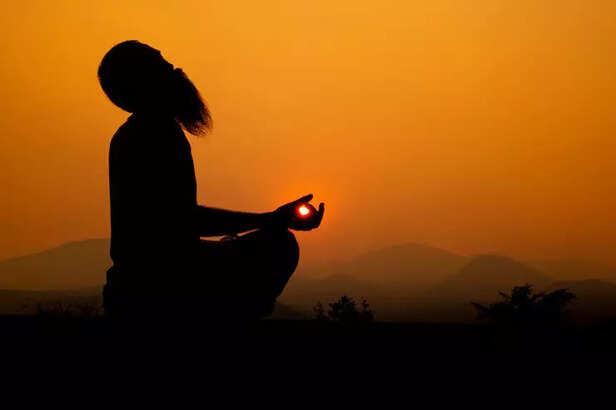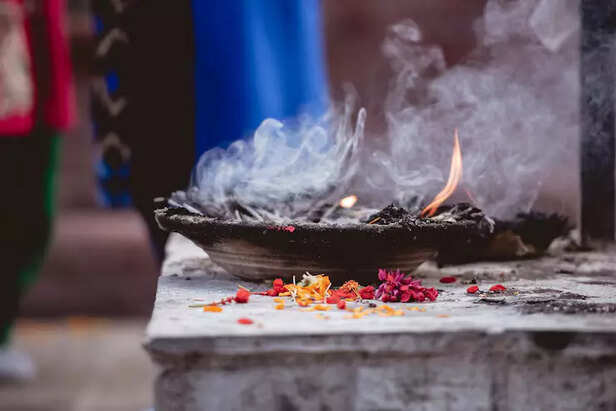The Illusion of Control and the Reality of Dharma
Amritansh Nayak | May 10, 2025, 14:00 IST

This article examines how our perception of choice is distorted by the illusion of control, which is influenced by ego and karma. Drawing on the Bhagavad Gita, it illustrates how dharma—the inner path of purpose, clarity, and higher truth—is the source of true freedom rather than control.
We firmly believe that we are in control of the decisions we make. However, our choices are frequently influenced by ingrained habits, cultural conditioning, and unsolved anxieties. The Bhagavad Gita dispels this myth and presents dharma, a higher way that is in line with inner reality rather than ego. The Gita encourages us to surrender as awakening rather than defeat in a society that is fixated on control. This essay examines how a more genuine, free manner of living can result from a knowledge of ego, karma, and dharma.

The
The profound belief that we are the creators of our own decisions is at the core of the human experience. The manufactured feeling of "I"—the ego—feeds off this delusion of power. Although a large portion of our decision-making is actually based on unconscious habits, it gives the impression that we are making free choices. Unresolved concerns, childhood training, and cultural expectations frequently influence our wants. Perhaps what appears to be free will is just the echo of habit or the desire to avoid discomfort. For example, we may decide on a job path that initially appears "right" to us, but upon closer examination, it may actually be motivated more by a fear of failing or a need for approval than by a genuine sense of purpose.
Such decisions, made under the influence of the ego, frequently result in uncertainty and discontent, according to the Bhagavad Gita. Instead, it challenges us to look past our own preferences and acknowledge the ways in which influences outside of our conscious awareness shape the way we behave. We cannot start to distinguish between egoic impulses and the silent pull of dharma until we engage in self-reflection and inner silence. Real freedom comes from realizing and transcending the illusion of control itself, not from controlling results.

The deeper spiritual meaning of dharma, particularly as taught in the Bhagavad Gita, is not about enforced duty, despite the fact that it is sometimes misinterpreted as a rigid moral responsibility or societal role. It is the organic flow of moral behavior that is consistent with both the greater order of the universe and one's inner character. It is the road that is exclusively yours, not because you picked it out, but rather because it is ingrained in your very soul. Dharma is not reactive, in contrast to choices motivated by ego, desire, or fear. It doesn't seek acceptance or steer clear of discomfort.
Rather, it silently leads from inside, and it frequently takes bravery to follow. Dharma requires honesty, whereas preference seeks solace. Dharma asks, "What is right for me to do?" in contrast to the ego's question, "What do I want?" Sometimes this higher instruction is quiet and unobtrusive. Stillness, self-awareness, and a readiness to listen past mental and emotional cacophony are the only ways to make it apparent. Dharma frequently feels more like a recognition—of what has always been ours to do—than a choice when we calm down enough to hear it.

Every decision we make is influenced by both the invisible strands of the past and the present. The law of cause and effect, or karma, affects both the circumstances under which we take action and the results of those actions, according to the Bhagavad Gita. In many respects, what we go through now is the result of decisions made in earlier eras, lives, or generations. As a result, many of our "choices" are conditioned reactions that emerge within a particular karmic context rather than being fully free. Our dharma must develop in the setting created by this karmic web.
Dharma is the part we are supposed to play in it, not passively but with consciousness and responsibility, whereas karma creates the framework. Reactive choices influenced by unresolved pasts or ingrained patterns are sometimes mistaken for deliberate ones. However, the Gita teaches that freedom from the shackling hold of karma comes by acting with clarity and detachment. Understanding the karmic undercurrents behind our situations encourages discernment and humility. Additionally, it gives us the ability to cease acting in an unconscious manner and begin acting in accordance with dharma, sowing the seeds for more intelligent futures.

Surrender is frequently misinterpreted as weakness or passivity in a culture that exalts control and boundless possibilities. However, in the Bhagavad Gita's spiritual perspective, surrender means waking up rather than giving up. It is the potent act of identifying with a truth that emanates from dharma and is more profound than one's own will. Krishna teaches that doing what is right—right in the sense of being in sync with our highest nature and the larger cosmic rhythm—is the path to true liberation rather than doing whatever we desire.
Giving in to dharma entails releasing the ego's incessant demands for dominance, results, and approval. It challenges us to see ourselves as tools of something bigger and to let go of the delusion that we are the ultimate doers. This is active engagement rather than mindless compliance. We transition from inner clarity to clarity and from purpose to impulse when we behave in accordance with dharma. This is where true emancipation starts—in wisely accepting life rather than running away from it. We enter life with elegance, bravery, and trust when we choose alignment over control.
Real liberation comes from connecting with our dharma, or inner purpose, rather than trying to control every event. The Bhagavad Gita exhorts us to act out of clarity rather than force, to transcend ego and karmic conditioning. We enter a life of trust, equilibrium, and inner freedom when we let go of the appearance of control. Dharma is the divine synchronization of our soul's truth with the beat of the cosmos; it is not about limitations.
Explore the latest trends and tips in Health & Fitness, Travel, Life Hacks, Fashion & Beauty, and Relationships at Times Life!

self-awareness
The Illusion of Control and the Ego
Such decisions, made under the influence of the ego, frequently result in uncertainty and discontent, according to the Bhagavad Gita. Instead, it challenges us to look past our own preferences and acknowledge the ways in which influences outside of our conscious awareness shape the way we behave. We cannot start to distinguish between egoic impulses and the silent pull of dharma until we engage in self-reflection and inner silence. Real freedom comes from realizing and transcending the illusion of control itself, not from controlling results.

Bhagavad Gita
The Inner Compass Beyond Preference: Dharma
Rather, it silently leads from inside, and it frequently takes bravery to follow. Dharma requires honesty, whereas preference seeks solace. Dharma asks, "What is right for me to do?" in contrast to the ego's question, "What do I want?" Sometimes this higher instruction is quiet and unobtrusive. Stillness, self-awareness, and a readiness to listen past mental and emotional cacophony are the only ways to make it apparent. Dharma frequently feels more like a recognition—of what has always been ours to do—than a choice when we calm down enough to hear it.

divine path
Pre-Existing Conditions, and Consequence
Dharma is the part we are supposed to play in it, not passively but with consciousness and responsibility, whereas karma creates the framework. Reactive choices influenced by unresolved pasts or ingrained patterns are sometimes mistaken for deliberate ones. However, the Gita teaches that freedom from the shackling hold of karma comes by acting with clarity and detachment. Understanding the karmic undercurrents behind our situations encourages discernment and humility. Additionally, it gives us the ability to cease acting in an unconscious manner and begin acting in accordance with dharma, sowing the seeds for more intelligent futures.

connecting with dharma
Giving Up as Real Freedom
Giving in to dharma entails releasing the ego's incessant demands for dominance, results, and approval. It challenges us to see ourselves as tools of something bigger and to let go of the delusion that we are the ultimate doers. This is active engagement rather than mindless compliance. We transition from inner clarity to clarity and from purpose to impulse when we behave in accordance with dharma. This is where true emancipation starts—in wisely accepting life rather than running away from it. We enter life with elegance, bravery, and trust when we choose alignment over control.
Real liberation comes from connecting with our dharma, or inner purpose, rather than trying to control every event. The Bhagavad Gita exhorts us to act out of clarity rather than force, to transcend ego and karmic conditioning. We enter a life of trust, equilibrium, and inner freedom when we let go of the appearance of control. Dharma is the divine synchronization of our soul's truth with the beat of the cosmos; it is not about limitations.
Explore the latest trends and tips in Health & Fitness, Travel, Life Hacks, Fashion & Beauty, and Relationships at Times Life!
